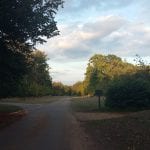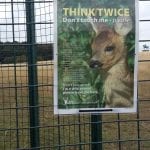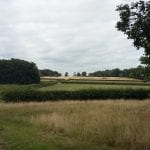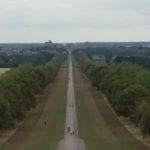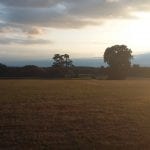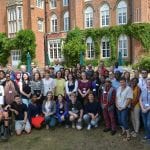Cumberland Lodge is a charity that empowers social progress through dialogue and debate, to build more peaceful, open and inclusive societies. Each year, the organisation holds ‘Life Beyond the PhD’, a conference aimed at helping doctoral students prepare for their future. This year, for the second time, Brighton Doctoral College ran a competition offering one of our students the chance to win a fully-funded place at this annual conference. Below, winning entrant, Tochukwu Ozulumba, PhD student in the School of Pharmacy and Biomolecular Sciences, tells us about her experience and shares some of her stunning photographs.
Life Beyond the PhD conference
Tochukwu Ozulumba
 I could hardly contain my excitement when I received the mail from the Doctoral College to say that I had won the competition to attend the ‘Life Beyond the PhD’ conference from 13 – 17 August, 2018. This annual conference attracts PhD students and early career researchers from different UK universities to celebrate the postgraduate research culture through sharing their experiences, workshops and discussions on the value of the PhD.
I could hardly contain my excitement when I received the mail from the Doctoral College to say that I had won the competition to attend the ‘Life Beyond the PhD’ conference from 13 – 17 August, 2018. This annual conference attracts PhD students and early career researchers from different UK universities to celebrate the postgraduate research culture through sharing their experiences, workshops and discussions on the value of the PhD.
Not only was the prospect of interacting with researchers from diverse disciplines for 4 days quite interesting, this also presented a perfect opportunity to take a break from the routine of #phdlife. And what better place to be than the historic Cumberland Lodge, nestled in the beautiful and serene Windsor Great Park?
Upon arrival, we were given a tour of the Lodge followed by a welcome talk by Dr Rachel Smillie, the Lodge’s Education Officer. In the first workshop, ‘Research Culture in the UK’, the talks by Prof Dorothy Bishop (Council for Defence of British Universities) and Prof Rosemary Hunter (Queen Mary University) addressed key issues in the UK research environment including grant funding, publishing, journal access and the Research/ Teaching Excellence Frameworks (R/TEF). Also, I learnt about ‘Academics Anonymous’, an anonymous blog series for academics to tell their stories, from Rachel Hall (Editor, Guardian Higher Education Network). The night ended with a trivia quiz and fortunately, my group won the coveted prize of chocolate!
Day 2 was quite intense with workshops on self-leadership, mental health, writing and speaking. Dr Steve Joy (Head of Researcher Development, University of Cambridge) highlighted the importance for early career researchers (ECRs) to have more breadth i.e. a range of experiences and a diverse professional network. In his words, ‘Self-leadership is about good choices, with good intent. Choose to be creative about your futures’. The next talk by Katie D’Arcy (Independent Careers Advisor) on speaking was particularly stimulating as we learnt about using non-violent communication techniques in research. Also, she emphasized the need for presenters to always ask, ‘What is the one thing you want the audience to remember?’ To quote her, ‘The end of a presentation is the beginning of a new conversation’. Being self-reflective, stress management during the PhD, building a support network, giving constructive feedback and dealing with imposter syndrome were highlights of the session on Mental Health led by Prof Gina Wisker (University of Brighton). The final workshop on writing was hosted by Katie and she explored the writing process, structuring tools and research proposal writing. An interesting part was the ‘free writing’ session where everyone had to write on their motivations for completing a PhD for five uninterrupted minutes in absolute silence. It was amazing to see how much progress we made in such a short period without distractions!
Day 3 started with delegates giving non-specialist research presentations in smaller multidisciplinary groups. It was interesting to listen to diverse talks ranging from Chinese medicine to needlework to Greek literature. We also received feedback on our presentations from one another, which was helpful. In the next workshop, ‘Views from the Recent Past’, Dr Becky Black (Social Researcher, Government Equalities Office) and Dr Bill Bruford (Independent Scholar and Musician) talked about their experiences during and after the PhD. Personally, the take-home message was to be proactive and strategic about my future beyond the PhD. After the talk, we had free time and I chose to explore the Park with other delegates over the very attractive option of Yogalates. We walked past the Ox Pond through the Deer Park right up to the Copper Horse statue of King George III atop the Snow Hill where we could see Windsor Castle in the distance. After the wonderful barbecue dinner in the garden, we headed in for the workshop on ‘Public Engagement’ led by Dr Hannah Rose Woods (Cultural Historian and Journalist) and Prof Helen Nicholson (Vice Principal, Royal Holloway, University of London). This session was very enlightening and touched on different modes of communication and engaging stakeholders who are resistant to public engagement.
The early hours of Day 4 were greeted with rain. However, it got off to a good start with a group task on developing an interdisciplinary approach to surviving a hypothetical ‘zombie apocalypse’ in Coventry. In her introduction to the ‘Interdisciplinary Research Proposals’ workshop, Dr Smillie explained the difference between multidisciplinarity and interdisciplinarity using the ‘fruit salad and smoothie’ analogy which I found very helpful. We spent the whole day in different groups collaborating on an interdisciplinary research proposal which incorporated the expertise of all group members. It was good to experience first-hand the challenges of working with researchers from diverse disciplines and learning how to work around these challenges to achieve a common goal. Group task over, I went on a walk with some delegates around the estate including the Guards Polo Club.
The last day started with the group interdisciplinary presentations before a mock grant panel comprising Canon Dr Ed Newell (Principal, Cumberland Lodge), Dr Jan Mock (Programme Director, Cumberland Lodge), Dr Smillie and Dr Joy. Fortunately, my group, Flitcroft, won the competition for our proposal aimed at ‘Increasing access for children and adolescents living in Newham social housing to Universities’ and yet again, the prize was chocolate! The conference came to an end with a stimulating talk by Dr Owen Gower (Director, UK Council for Graduate Education) on ‘Why is a PhD worth it?’ where he discussed recent trends in the UK postgraduate research landscape and the value of the PhD. I was particularly inspired by a quote from his talk attributed to Prof Glyn Turton – ‘A PhD is for life, not just for academia’. Afterwards, we had group photographs, lunch and said our goodbyes.
I would like to thank the staff of Cumberland Lodge for the platform to discuss varied subjects in a supportive environment in addition to the wonderful food and accommodation. I would also like to thank the Doctoral College for the opportunity to attend the Life Beyond the PhD Conference. It was a great learning experience and offered the opportunity to share experiences with a diverse cohort of ECRs.
Conference photo gallery
To find out more about Tochi and her work, take a look at her LinkedIn profile and visit her on Twitter.
You might also like to check out another report on ‘Life Beyond the PhD’ from our first conference attendee, Uschi Klein (now Dr Uschi Klein).





